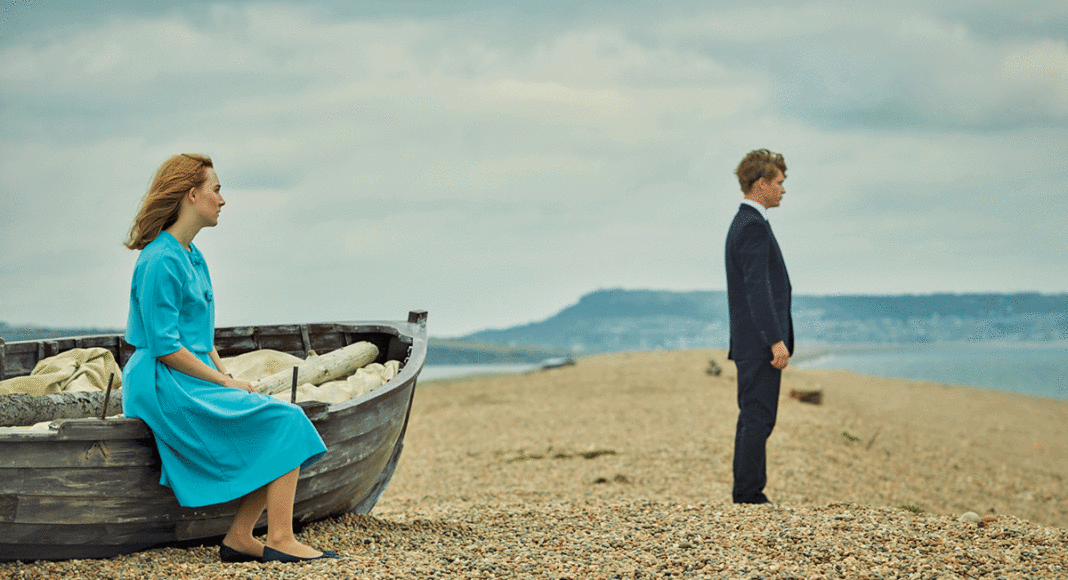Back in 1966, there was a low-key British movie called The Family Way, about young newlyweds too wracked with nerves, their families’ expectations, and their own inexperience to properly consummate their marriage. The situation was played for gentle, poignant humor, as the days wore on, and the already embarrassed young couple had to cope with well-meaning interference from both families attempting to cheerlead them on and offer advice. The film gained attention at the time for launching star Hayley Mills out of her Disney/Pollyanna box and into her first grown-up role.
It seems like there are going to be faint echoes of The Family Way—without the humor—in the domestic drama, On Chesil Beach. Scripted by Ian McEwan, from his own novel, and directed by Dominic Cooke, it’s the story of a young couple navigating the first few hours of married life at a seaside hotel on the evening of their wedding day. But in this case, the fateful wedding night doesn’t just launch the story; it is the story.
Yes, its aftermath plays out into the future in a couple of brief, clumsy time-shifts at the very end of the movie. And their early relationship as the couple falls in love is told in flashbacks throughout the day in that hotel room. But sloppy, inconsistent storytelling keeps us from getting caught up in the tale’s emotional core, and the audience, too, leaves unsatisfied.
The story is set in 1962, just before the ’60s began to swing. Florence (Saoirse Ronan) and Edward (Billy Howle) arrive at a nice hotel on the Dorset coast to begin their honeymoon. It’s late afternoon, and after a walk on the beach, their nervous attempts to become more intimate are interrupted, first by a pair of buffoony comic waiters, but mostly by a series of flashbacks to their courtship.
She’s the daughter of wealthy, snobby society parents, who plays violin with a string quartet she founded at Oxford. He’s a working-class scholar who earned a First in History, also at Oxford, and maintains his good cheer, despite his addled Mum (Anne-Marie Duff). But his mum and family adore Florence (her winning them over provides some of the movie’s best scenes), and the couple have come to the altar with their future together looking bright.
But it turns out there’s a skeleton in the closet of Florence’s past, making their wedding night extra fraught. Matters aren’t made any easier by the fact that they are both virgins. McEwan’s point seems to be that, in a repressed era when sex is simply not discussed, demons remain unexorcised, and consequences can be severe, reaching out their menacing tentacles to affect lives far into the future.
But McEwan and Cooke can’t get a grip on their narrative. Most of the story proceeds from Edward’s viewpoint, so it often seems like he’s being victimized by Florence’s mystifying behavior. Then, a pivotal decision he makes half an hour before the movie’s end alters that scenario—but it’s withheld from the audience until literally the last few frames of the film.
Maybe the story played better on the page, where the author had the luxury of time and space to grow his character motivations. On the other hand, I loved the movie Atonement, also based on a McEwan novel, and also depicting the ways that sexual fear and loathing might poison present and future lives. But that movie deployed a trenchant coda that crystallized the story’s themes with a wallop.
No such coherent wrap-up occurs here. The story elements all seem to be in place, but the filmmakers never manage to turn the dross of pervasive melancholy into the gold of transcendent meaning.
ON CHESIL BEACH
** (out of four)
With Saoirse Ronan, Billy Howle, and Anne-Marie Duff. Written by Ian McEwan. Directed by Dominic Cooke. A Bleecker Street release. Rated R. 110 minutes.














